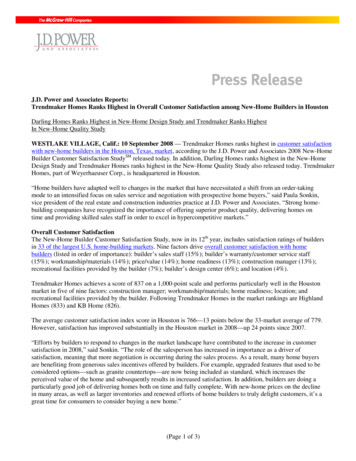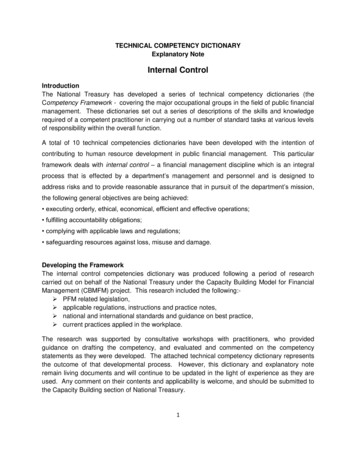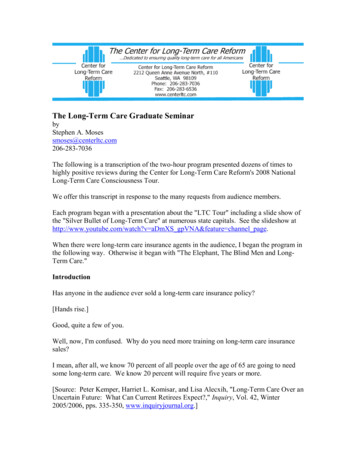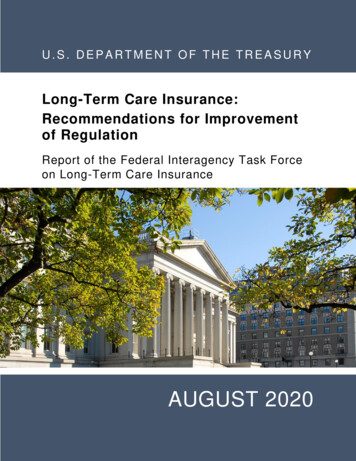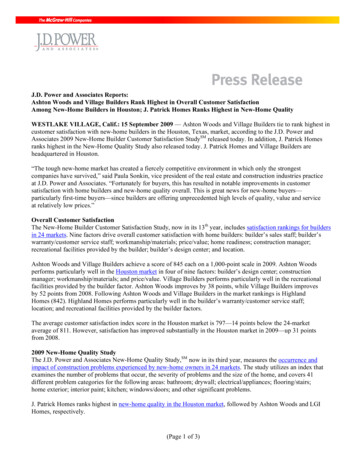
Transcription
OntarioAssociationOf Residents’CouncilsLong Term Care Homes Act, 2007, & Ontario Regulation 79/10The Long-Term Care Homes Act (LTCHA) is rooted in the philosophy of resident-centered care.The act strongly supports collaboration and mutual respect among residents, their families, staffand volunteers, to ensure that the care and services provided will meet the needs of residents andenable them to live their lives to the fullest extent possible.The following excerpts from the LTCHA addresses specific clauses outlining the rights, roles andresponsibilities of residents as members of Residents’ Councils. OARC has provided briefexplanations in blue text to assist you in understanding these critical aspects of the law.For more information on the Long Term Care Homes Act, 2007 please lish/elaws statutes 07l08 e.htm .For more information about LTCHA Act, 2007 Regulation 79/10, please /elaws regs 100079 e.htm10155 Yonge Street, Suite 207-208Richmond Hill, ON, L4C 1T5T 905-770-3710 Toll Free: 1-800-532-0201F 905-770-2755 www.ontarc.com
LONG-TERM CARE HOMES ACT, 2007Residents’ Bill of Rights3. (1) Every licensee of a long-term care home shall ensure that the following rights of residentsare fully respected and promoted:The owner and/or administrator of every long-term care home must ensure that everyoneworking and volunteering in the home knows, respects and promotes the Residents’ Bill ofRights.17. Every resident has the right to raise concerns or recommend changes in policies and serviceson behalf of himself or herself or others to the following persons and organizations withoutinterference and without fear of coercion, discrimination or reprisal, whether directed at the residentor anyone else,i.the Residents’ Council,As a resident, you have the right to raise concerns or recommend changes to policies andservices, on behalf of yourself or any other resident. Your comments can be confidentlyraised and discussed at Residents’ Council meetings and you can do so: without any interaction or involvement from any staff member, volunteer or resident. free from fear of anyone using their power or intimidating behaviour towards you, oranyone else, in trying to prevent you from speaking up. free from fear of discrimination from anyone because you spoke up.This applies to all residents in your long-term care home.20. Every resident has the right to participate in the Residents’ Council. 2007, c. 8, s. 3 (1).Mission statement4. (1) Every licensee shall ensure that,(a) there is a mission statement for each of the licensee’s long-term care homes that sets outthe principles, purpose and philosophy of care of the home: andEvery long-term care home has a mission statement that states the purpose, theprinciples and philosophy of care of the home. Residents’ Council members should beaware of this statement and understand the home’s goals.LTCH Act & Regulations Addressing Residents’ Councils Page 2 of 14Updated 02/09/2013
(b) the principles, purpose and philosophy of care set out in the mission statement are put intopractice in the day-to-day operation of the long-term care home. 2007, c. 8, s. 4 (1).Homes are responsible for putting their stated purpose, principles and philosophy of careinto practice.Collaboration(3) The licensee shall ensure that the mission statement is developed, and revised as necessary,in collaboration with the Residents’ Council and the Family Council, if any, and shall invite the staffof the long-term care home and volunteers to participate. 2007, c. 8, s. 4 (3).The administration in the home is responsible for working together with the Residents’Council, Family Council and any staff or volunteers who wish to participate in thedevelopment or revision of the home’s mission statement.Updating(4) At least once every five years after a mission statement is developed, the licensee shall consultwith the Residents’ Council and the Family Council, if any, as to whether revisions are required,and shall invite the staff of the long-term care home and volunteers to participate. 2007, c. 8,s. 4 (4).Every five years, the administration of your long-term care home is responsible for reexamining the current mission statement to determine if revisions are needed. In doing so,the administration must engage in discussion with, and seek the advice of Residents’Council and the Family Council members, and of any other staff or volunteer who wishes tocontribute. The administration is also responsible for extending an invitation to these peopleto participate in this collaborative process.PART IV: COUNCILSResidents’ Council(Sections 56-68 are displayed chronologically in the LTCHA under PART IV, COUNCILS.)56. (1) Every licensee of a long-term care home shall ensure that a Residents’ Council isestablished in the home. 2007, c. 8, s. 56 (1).Only residents(2) Only residents of the long-term care home may be members of the Residents’ Council. 2007,c. 8, s. 56 (2).LTCH Act & Regulations Addressing Residents’ Councils Page 3 of 14Updated 02/09/2013
Licensee duty to meet with Council63. If invited by the Residents’ Council or the Family Council, the licensee shall meet with thatCouncil or, if the licensee is a corporation, ensure that representatives of the licensee meet withthat Council. 2007, c. 8, s. 63.Attendance at meetings – licensees, staff, etc.64. A licensee of a long-term care home shall attend a meeting of the Residents’ Council or theFamily Council only if invited, and shall ensure that the staff, including the Administrator, and otherpersons involved in the management or operation of the home attend a meeting of either Councilonly if invited. 2007, c. 8, s. 64. The licensee, usually through their designate (the home’s Administrator), must ensure thatthey, or any other staff member, do not attend a Residents’ Council meeting unless invited.Residents’ Council meetings are for residents only. Any other person must not attend theCouncil meeting unless invited. This is to ensure residents have the opportunity to meetprivately to discuss any of their experiences as a resident, in a safe, secure environmentamong their peers.All Council members need to be in agreement with a guest being invited to a meeting.Guests may be invited to attend a meeting for a specific purpose and then asked to leavewhile the Council continues their business, or guests may be invited to attend a meeting fora specific purpose and then permitted to stay for the duration of the meeting. Councilmembers make this decision prior to extending the invitation.Powers of Residents’ Council57. (1) A Residents’ Council of a long-term care home has the power to do the following:1. Advise residents respecting their rights and obligations under this Act.Council members/residents have the right to ask for and understand their rights andobligations under the Long-Term Care Homes Act, 2007.2. Advise residents respecting the rights and obligations of the licensee under this Act andunder any agreement relating to the home.Council members/residents have the right to ask for and understand the rights andobligations of the licensee/owner under the Long-Term Care Homes Act, 2007, and anyother agreement relating to the home, such as the agreement the home has with theirlocal health integration network.3. Attempt to resolve disputes between the licensee and residents.Council members have the right to use their collective voice to attempt to resolve anissue between the home administration and a resident or residents.LTCH Act & Regulations Addressing Residents’ Councils Page 4 of 14Updated 02/09/2013
4. Sponsor and plan activities for residents.Council members have the right to plan activities for residents and, if there is a costinvolved, Council will use its Residents’ Council funds to pay for the activity.5. Collaborate with community groups and volunteers concerning activities for residents.Council members have the right to work together with community groups and volunteerson activities of interest to residents and make their own arrangements.6. Advise the licensee of any concerns or recommendations the Council has about theoperation of the homes.Council has the right to advise the owner/administrator of any concerns orrecommendations they have about the operation of their home.7. Provide advice and recommendations to the licensee regarding what the residents wouldlike to see done to improve care or the quality of life in the home.Council has the right to provide advice or recommendations to the owner/administratorregarding what the residents would like to see done to improve care or the quality of lifein their home.8. Report to the Director any concerns and recommendations that in the Council’s opinionought to be brought to the Director’s attention.Council has the right to report directly to the Director of the Ministry of Health and LongTerm Care’s Performance Compliance and Improvement Branch any concerns andrecommendations that the Council believes should be brought to the Director’s attention.9. Review,i.inspection reports and summaries received under sections 149,A copy of all inspection reports issued by the Ministry of Health and Long-TermCare’s Performance Compliance and Improvement Branch that concern yourhome is sent directly to the President of the Residents’ Council. These reports areintended to be shared at Residents’ Council meetings.ii.the detailed allocation, by the licensee, of funding under this Act and amounts paid byresidents,iii.the financial statements relating to the home filed with the Director under theregulations,iv.the financial statements relating to the home filed with the Director under theregulations or provided to a local health integration network, andLTCH Act & Regulations Addressing Residents’ Councils Page 5 of 14Updated 02/09/2013
v.the operation of the home.The Residents’ Council has the right to review any of the above reports orstatements whenever requested. OARC suggests that Councils extend aninvitation to the home administrator to attend a Council meeting for the purpose ofhaving an open discussion about each document on an annual basis.10. Exercise any other powers provided for in the regulations. 2007, c. 8, ss. 57 (1), 195 (4,5).Detailed allocation211. For the purpose of subparagraph 9 ii of subsection 57 (1) and subparagraph 7 ii ofsubsections 60 (1) of the Act, “detailed allocation” means the reconciliation report for a calendaryear submitted to the Minister and to the LHIN and the auditor’s report on that reconciliation report.Council has the right to review the Annual Reconciliation Report submitted to the Ministerand to the home’s local health integration network along with the associated auditor’s report.OARC suggests that this take place at the spring/June meeting, as the calendar year forhomes to report is March 31st.Duty to respond(2) If the Residents’ Council has advised the licensee of concerns or recommendations undereither paragraph 6 or 8 of subsection (1), the licensee shall, within 10 days of receiving the advice,respond to the Residents’ Council in writing. 2007, c. 8, s. 57 (2). ***See Regulation SectionReporting and ComplaintsResidents’ Council Assistant58. (1) Every licensee of a long-term care home shall appoint a Residents’ Council assistant who isacceptable to that Council to assist the Residents’ Council. 2007, c. 8, s. 58 (1).Residents’ Councils have the right to receive help and support from a staff member who isacceptable to the Council members. Securing this person, who serves as an assistant tothe Residents’ Council, should be a negotiated process with the home administrator. It is notappropriate for the administrator to assign this responsibility to a staff member withouthaving first discussed this with a member of the Residents’ Council’s leadership team.Duties(2) In carrying out his or her duties, a Residents’ Council assistant shall take instructions from theResidents’ Council, ensure confidentiality where requested and report to the Residents’ Council.2007, c. 8, s. 58 (2).The Residents’ Council assistant has a pivotal role in most Council operations. Theassistant is effectively working for the Council while in this role, not the long-term care home.LTCH Act & Regulations Addressing Residents’ Councils Page 6 of 14Updated 02/09/2013
This person is not a member of the Council and they are not part of the Council. If it isdetermined that assistance is required, an acceptable person is secured throughnegotiations with the administrator. Duties may include, but are not limited to, assisting withagenda preparation, organizing the meeting space, recording minutes, facilitatingdiscussion, and assisting with elections. The assistant is the link between the Counciloperations and the long-term care home.Licensee to co-operate with and assist Councils62. A licensee shall co-operate with the Residents’ Council, the Family Council, the Residents’Council assistant, and the Family Council assistant and shall provide them with such financialand other information and such assistance as is provided for in the regulations. 2007, c. 8,s. 62.No interference by licensee65. A licensee of a long-term care home,(a) shall not interfere with the meetings or operation of the Residents’ Council of the FamilyCouncil;(b) shall not prevent a member of the Residents’ Council or Family Council from entering thelong-term care home to attend a meeting of the Council or to perform any functions as amember of the Council and shall not otherwise hinder, obstruct or interfere with such amember carrying out those functions;(c) shall not prevent a Residents’ Council assistant of a Family Council assistant from enteringthe long-term care home to carry out his or her duties or otherwise hinder, obstruct orinterfere with such an assistant carrying out those duties;(d) shall ensure that no staff member, including the Administrator or other person involved inthe management or operation of the home, does anything that the licensee is forbidden todo under clauses (a) to (c). 2007, c. 8, s. 65.Immunity – Council members, assistants66. No action or other proceeding shall be commenced against a member of a Residents’ Councilor Family Council or a Residents’ Council assistant or Family Council assistant for anything done oromitted to be done in good faith in the capacity as a member or an assistant. 2007, c. 8, s. 66.This clause relates to an action or proceedings against an individual, not the long-term carehome (licensee). There will be no action or other proceedings (legal action, for example)against a member of either the Residents’ Council or Family Council, nor their respectiveassistant. If that person, in their capacity as member or assistant, works in good faith in theconduct of his or her duties, no proceeding or action can be taken against that person.LTCH Act & Regulations Addressing Residents’ Councils Page 7 of 14Updated 02/09/2013
Duty of licensee to consult Councils67. A licensee has a duty to consult regularly with the Residents’ Council, and with the FamilyCouncil, if any, and in any case shall consult with them at least every three months. 2007, c. 8,s. 67.OARC believes that the intent here is to promote regular communication and develop amutually respectful working relationship between Residents’ Council members and theadministration. Meeting every three months provides the administration with an opportunityto update the Council on the home’s quality improvement work, along with any other itemsof mutual interest.Regulations68. The Lieutenant Governor in Council may make regulations for carrying out the purposes andprovisions of this Part. 2007, c. 8, s. 68 (1).Specific inclusions(2) Without restricting the generality of subsection (1), the Lieutenant Governor in Council maymake regulations,(a) requiring a licensee to assist in the formation of Residents’ councils and Family Councils,and governing the assistance that the licensee is required to provide those Councils. 2007,c. 8, s. 68 (2).Information for residents, etc.78. (1) Every licensee of a long-term care home shall ensure that,(a) a package of information that complies with this section is given to every resident and to thesubstitute decision-maker of the resident, if any, at the time that the resident is admitted;(b) the package of information is made available to family members of residents and persons ofimportance to residents;(c) the package of information is revised as necessary;(d) any material revisions to the package of information are provided to any person who hasreceived the original package and who is still a resident or substitute decision-maker of aresident; and(e) the contents of the package and of the revisions are explained to the person receiving them.2007, c. 8, s. 78 (1)LTCH Act & Regulations Addressing Residents’ Councils Page 8 of 14Updated 02/09/2013
Contents(2) The package of information shall include, at a minimum,(o) information about the Residents’ Council, including any information that may be providedby the Residents’ Council for inclusion in the package. 2007, c. 8, ss. 78 (2),Councils have the right to provide information about their home’s Residents’ Council, sothat it can be included in the information package for new residents and their families.For example, the Residents’ Council may wish to include a brochure or informationsheet.Posting of information79. (1) Every licensee of a long-term care home shall ensure that the required information is postedin the home, in a conspicuous and easily accessible location in a manner that complies with therequirements, if any, established by the regulations. 2007, c. 8, s. 79 (1).Communication(2) Every licensee of a long-term care home shall ensure that the required information iscommunicated, in a manner that complies with any requirements that may be provided for in theregulations, to residents who cannot read the information. 2007, c. 8, s. 79 (2).OARC views Council meetings as an opportunity to share required information withresidents who are unable to read the information.Required information(3) The required information for the purposes of subsections (1) and (2) is,(n) the most recent minutes of the Residents’ Council meetings, with the consent of theResidents’ Council. 2007, c. 8, ss. 79 (3)Posting of Residents’ Council meeting minutes needs the approval of Council members.Satisfaction survey85. (1) Every licensee of a long-term care home shall ensure that, at least once in every year, asurvey is taken of the residents and their families to measure their satisfaction with the home andthe care, services, programs and goods provided at the home. 2007, c. 8, s. 85 (1).Action(2) A licensee shall make every reasonable effort to act on the results of the survey and to improvethe long-term care home and the care, services, programs and goods accordingly. 2007, c. 8,s. 85 (2).LTCH Act & Regulations Addressing Residents’ Councils Page 9 of 14Updated 02/09/2013
Advice(3) The licensee shall seek the advice of the Residents’ Council and the Family Council, if any, indeveloping and carrying out the survey, and in acting on its results. 2007, c. 8, s. 85 (3). Residents’ Council members have the right to have input into the development of theirhome’s annual satisfaction survey.Residents’ Council members have the right to have input into how the survey is carried outin their home.Residents’ Council members have the right to offer suggestions on how to act upon areasrequiring improvement in their home.Documentation(4) The licensee shall ensure that,(a) the results of the survey are documented and made available to the Residents’ Counciland the Family Council, if any, to seek their advice under subsection (3);The administration (as designate of licensee) must share the survey results with theResidents’ Council members with the intent of receiving their advice on areasrequiring improvement.(b) the actions taken to improve the long-term care home, and the care, services, programsand goods based on the results of the survey are documented and made available to theResidents’ Council and the Family Council, if any;The administration (as designate of licensee) must ensure that any actions the homeis undertaking to improve identified areas within the home are documented andshared with Residents’ Council.(c) the document required by clauses (a) and (b) are made available to residents and theirfamiliesThe document produced under (b) is available to any resident and any familymember.(d) the documentation required by clauses (a) and (b) is kept in the long-term care home andmade available during an inspection under Part IX. 2007, c. 8, s. 85 (4).The document must be kept by the home and OARC suggests that Residents’Council meeting minutes reflect their involvement in the home’s satisfaction surveyprocess in detail.LTCH Act & Regulations Addressing Residents’ Councils Page 10 of 14Updated 02/09/2013
PART IX COMPLIANCE AND ENFORCEMENTInspectionsMeeting with Councils145. Where an inspection is required under section 143, the inspector may meet with theResidents’ Council or the Family Council, if requested or permitted to do so by the Council. 2007,c. 8, s. 145. The inspection referred to in section 143 covers any inspection of the home whether it isintended to investigate a complaint, investigate a critical incident, or carry out a follow-upinspection or an in-depth inspection of the home, known as an RQI (Resident QualityInspection).During an RQI, a Residents’ Council representative will always be interviewed.A Residents’ Council may request an interview with an inspector relating to any of the otherreasons for an investigation in the home.Inspection report149. (1) After completing an inspection, an inspector shall prepare an inspection report and give acopy of the report to the licensee and to the Residents’ Council and the Family Council, if any.2007, c. 8, s. 149 (1).A Residents’ Council President will receive a summary of the inspection report directly fromthe Ministry of Health and Long-Term Care. It is expected that this report be shared withCouncil members and discussed at a Council meeting.LTCH Act & Regulations Addressing Residents’ Councils Page 11 of 14Updated 02/09/2013
ONTARIO REGULATION 79/10Communication methods43. Every licensee of a long-term care home shall ensure that strategies are developed andimplemented to meet the needs of residents with compromised communication and verbalizationskills, of residents with cognitive impairment and of residents who cannot communicate in thelanguage or languages used in the home. O. Reg. 79/10, s. 43.The administration (as designate of licensee) must develop alternative ways tocommunicate with residents who have difficulty communicating. Alternative methods needto be developed and implemented to ensure there are ways to communicate with allresidents, e.g., Residents’ Bill of Rights produced by the Aphasia Institute.Menu planning71. (1) Every licensee of a long-term care home shall ensure that the home’s menu cycle,(f) is reviewed by the Residents’ Council for the home;The Residents’ Council is aware of the home’s menu cycle and has a committee in placeto review menus being introduced prior to each cycle.Dining and snack service73. (1) Every licensee of a long-term care home shall ensure that the home has a dining and snackservice that includes, at a minimum, the following elements:2. Review, subject to compliance with subsection 71 (6), of meal and snack times by theResidents’ Council. The Residents’ Council has the right to review the dining room service, including choicesavailable, as well as meal times.The Residents’ Council has the right to review the snack service, including choicesavailable, as well as the snack times.Recreational and social activities program65. (2) Every licensee of a long-term care home shall ensure that the program includes,(d) opportunities for resident and family input into the development and scheduling of recreationand social activities. O. Reg. 79/10, s. 65 (2). The Residents’ Council has the right to provide input in the choices of activities.The Residents’ Council has the right to provide input relating to the scheduling ofactivities.See 57 (1) 4. Powers of a Residents’ Council for related information.LTCH Act & Regulations Addressing Residents’ Councils Page 12 of 14Updated 02/09/2013
REPORTING AND COMPLAINTSDealing with complaints101. (1) Every licensee shall ensure that every written or verbal complaint made to the licensee ora staff member concerning the care of a resident or operation of the home is dealt with asfollows:1. The complaint shall be investigated and resolved where possible, and a response thatcomplies with paragraph 3 provided within 10 business days of the receipt of thecomplaint, and where the complaint alleges harm or risk of harm to one or moreresidents, the investigation shall be commenced immediately.All complaints, verbal or written, by an individual or a Residents’ Council, should beinvestigated by the management of the home and resolved as quickly as possible.2. For those complaints that cannot be investigated and resolved within 10 business days,an acknowledgement of receipt of the complaint shall be provided within 10 businessdays of receipt of the complaint including the date by which the complainant canreasonably expect a resolution, and a follow-up response that complies with paragraph 3shall be provided as soon as possible in the circumstances.Given that it may not be possible to investigate and resolve some complaints within10 business days, management must acknowledge receipt of the complaint,communicate their plan to pursue the investigation, and provide the complainant witha schedule for resolving the issue.3. A response shall be made to the person who made the complaint, indicating,i.what the licensee has done to resolve the complaint, orii.that the licensee believes the complaint to be unfounded and the reasons for thebelief. O. Reg. 79/10, s. 101 (1).The complainant, whether an individual or the Council, has the right to receivea report detailing what has been done to resolve the complaint. If the licenseeconsiders the complaint to be unfounded, they must provide an explanation asto why.(2) The licensee shall ensure that a documented record is kept in the home that includes,(a) the nature of each verbal or written complaint;(b) the date the complaint was received;(c) the type of action taken to resolve the complaint, including the date of the action, timeframes for actions to be taken and any follow-up action required;LTCH Act & Regulations Addressing Residents’ Councils Page 13 of 14Updated 02/09/2013
(d) the final resolution, if any;(e) every date on which any response was provided to the complainant and a descriptionof the response; and(f) any response made in turn by the complainant. O. Reg. 79/10, s. 101 (2).The licensee, through their designate, must keep a detailed record of the complaint. OARCsuggests if Council is making the complaint, they also keep a detailed record of thecomplaint and all investigation correspondence for review at a Council meeting.(3) The licensee shall ensure that,(a) the documented record is reviewed and analysed for trends at least quarterly;(b) the results of the review and analysis are taken into account in determining whatimprovements are required in the home; and(c) a written record is kept of each review and of the improvements made in response.O. Reg. 79/10, s. 101 (3).Continuous Quality Improvement228. Every licensee of a long-term care home shall ensure that the quality improvement andutilization review system required under section 84 of the Act complies with the followingrequirements:3. The improvements made to the quality of the accommodation, care, services, programs andgoods provided to the residents must be communicated to the Residents’ Council, familyCouncil and the staff of the home on an ongoing basis.4. A record must be maintained by the licensee setting out,i.the matters referred to in paragraph 3;ii.the names of the persons who participated in evaluations and the datesimprovements were implemented;iii.the communications under paragraph 3.Every home must develop a continuous quality improvement plan and Residents’ Councilhas the right to know which areas their home is focusing on. OARC suggests that theadministrator share the details and progress of the quality improvement plan as part of theirreport to Council every three months. This could be a time for celebration by both theadministration and the Council. OARC also recommends that Council members and theadministration discuss resident involvement with the Quality Committee process in theirhome.LTCH Act & Regulations Addressing Residents’ Councils Page 14 of 14Updated 02/09/2013
Long Term Care Homes Act, 2007, & Ontario Regulation 79/10 The Long-Term Care Homes Act (LTCHA) is rooted in the philosophy of resident-centered care. The act strongly supports collaboration and mutual respect among residents, their families, staff and volunteers, to ensure that the care and services provided will meet the needs of residents and
